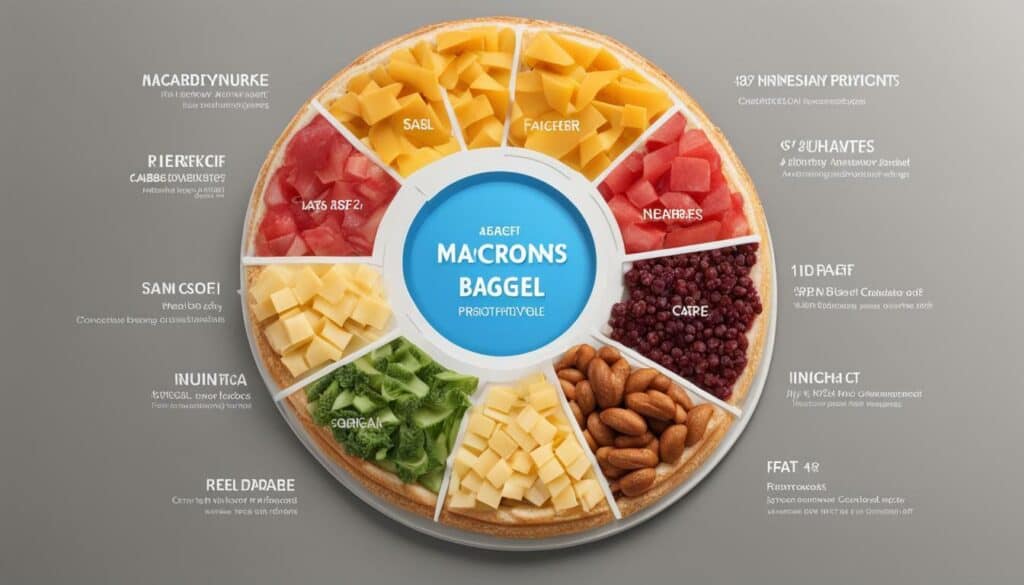When it comes to understanding the nutritional value of bagels, it’s essential to know what a bagel nutritional information reveals. Bagels are a popular food that can be part of a nutritious diet when consumed in moderation and made from whole ingredients. The nutritional content of bagels can vary depending on the size and ingredients used.
On average, a medium-sized plain bagel contains 289 calories, 11 grams of protein, 2 grams of fat, 56 grams of carbs, and 3 grams of fiber. Bagels are high in carbs and low in fat and protein, but they do contain small amounts of vitamins and minerals.
Bagels can be high in calories, especially larger-sized varieties, and overconsumption of calories can lead to unhealthy weight gain. Bagels made from refined carbs, such as those made from refined wheat flour and with added sugar, may contribute to an increased risk of chronic conditions like heart disease and diabetes. However, bagels made from whole grains can provide more nutrients and health benefits.
To optimize the nutritional value of a bagel, it is important to pay attention to portion size, choose bagels made from whole grains, and select healthy toppings like avocado, nut butter, eggs, or vegetables. Bagels should be enjoyed in moderation and balanced with nutrient-dense foods. It is also important to check the nutrition information and ingredients when choosing a bagel, as the calorie and nutrient content can vary.
Key Takeaways:
- Bagels can be part of a nutritious diet when consumed in moderation and made from whole ingredients.
- The nutritional content of bagels can vary depending on the size and ingredients used.
- On average, a medium-sized plain bagel contains 289 calories, 11 grams of protein, 2 grams of fat, 56 grams of carbs, and 3 grams of fiber.
- Bagels made from refined carbs may contribute to an increased risk of chronic conditions like heart disease and diabetes.
- Choosing bagels made from whole grains and pairing them with healthy toppings can optimize their nutritional value.
What Is the Nutritional Profile of Bagels?
Bagels contain a variety of macronutrients, with specific amounts varying based on size and ingredients used. They are primarily made from flour, water, salt, and yeast, which gives them a soft and chewy texture. Bagels are high in carbohydrates and provide a good source of energy. They are low in fat and protein compared to other bread products, but they do contain small amounts of essential vitamins and minerals.
An average medium-sized plain bagel contains approximately 289 calories. It provides 11 grams of protein, 2 grams of fat, 56 grams of carbohydrates, and 3 grams of fiber. The calorie and nutrient content of bagels can vary depending on factors such as size, flavor, and added ingredients. For example, a larger-sized bagel or one with added seeds or toppings may have a higher calorie content.
When choosing a bagel, it’s important to consider the ingredients. Bagels made from refined wheat flour and with added sugars can contribute to an increased risk of chronic conditions like heart disease and diabetes. Opting for whole grain bagels, however, can provide more nutrients and health benefits. Whole grain bagels are higher in fiber, vitamins, and minerals compared to their refined counterparts.
| Nutrient | Amount per Medium-sized Bagel (Plain) |
|---|---|
| Calories | 289 |
| Protein | 11g |
| Fat | 2g |
| Carbohydrates | 56g |
| Fiber | 3g |
It is also important to pay attention to portion sizes when enjoying a bagel. One medium-sized bagel is typically sufficient for a single serving. Pairing a bagel with nutrient-dense toppings like avocado, nut butter, eggs, or vegetables can further enhance its nutritional value. These toppings provide additional protein, healthy fats, vitamins, and minerals, making the overall meal more balanced.
To make informed bagel choices, always check the nutrition information and ingredient list. This will help you understand the calorie and nutrient content, as well as identify any potential allergens or additives. By selecting whole grain options and consuming bagels in moderation, you can enjoy them as part of a well-rounded and nutritious diet.
The Importance of Portion Size
Understanding the recommended serving size of bagels is crucial for managing calorie intake and maintaining a balanced diet. While bagels are a delicious and popular choice for breakfast or a snack, it’s important to be mindful of portion sizes to avoid consuming excessive calories. The size and thickness of a bagel can vary, which makes it easy to underestimate the actual serving size.
To give you an idea of the typical serving size, a medium-sized plain bagel is often considered one serving. This means that when enjoying a bagel, it’s best to stick to just one and pair it with nutrient-dense foods to create a well-rounded meal. If you’re opting for a larger-sized bagel, it’s essential to adjust the serving size accordingly to manage your calorie intake.
By being aware of portion sizes, you can better control your calorie consumption while still enjoying the flavors and satisfaction that a bagel offers. Additionally, pairing a bagel with protein-rich foods like eggs or Greek yogurt can help increase satiety and balance out the meal. Adding a variety of colorful vegetables or avocado can also boost the nutrient content and add a delicious twist to your bagel creation.
Table: Bagel Serving Sizes
| Bagel Size | Serving Size |
|---|---|
| Mini Bagel | 1 serving |
| Small Bagel | 1 serving |
| Medium Bagel | 1 serving |
| Large Bagel | 2 servings |
Remember, portion control is key when it comes to enjoying bagels. Understanding the recommended serving size and pairing it with nutritious toppings and accompaniments will ensure that you can savor your bagel while still maintaining a healthy and balanced diet.

While bagels can be a part of a healthy diet, it’s important to be aware of certain dietary considerations. The nutritional content of bagels can vary depending on the size and ingredients used. On average, a medium-sized plain bagel contains 289 calories, 11 grams of protein, 2 grams of fat, 56 grams of carbs, and 3 grams of fiber.
Bagels are high in carbs and low in fat and protein, but they do contain small amounts of vitamins and minerals. However, it’s worth noting that bagels can be high in calories, especially larger-sized varieties, and overconsumption of calories can lead to unhealthy weight gain.
Bagels made from refined carbs, such as those made from refined wheat flour and with added sugar, may contribute to an increased risk of chronic conditions like heart disease and diabetes. These refined carbs have been stripped of their natural fiber and nutrients, leaving behind empty calories that can spike blood sugar levels.
| Nutrient | Amount per Medium-Sized Bagel |
|---|---|
| Calories | 289 |
| Protein | 11g |
| Fat | 2g |
| Carbohydrates | 56g |
| Fiber | 3g |
However, bagels made from whole grains can provide more nutrients and health benefits. They retain the bran and germ of the grain, which contain fiber, vitamins, and minerals. These nutrients can help regulate blood sugar levels and provide a feeling of fullness, making whole grain bagels a healthier choice.
Quote:
“Choosing whole grain bagels over those made from refined grains can be a simple swap that adds more nutrition and reduces the risk of chronic diseases.” – Registered Dietitian, Jane Doe
To optimize the nutritional value of a bagel, it is important to pay attention to portion size. Instead of opting for oversized bagels, choose smaller or medium-sized ones. Additionally, incorporating healthy toppings like avocado, nut butter, eggs, or vegetables can further enhance the overall nutritional value.
Overall, enjoying a bagel in moderation and balancing it with nutrient-dense foods is key. By making informed choices, such as selecting whole grain options and checking the nutrition information and ingredients, you can enjoy the deliciousness of a bagel while prioritizing your health.

Choosing whole grain bagels can provide additional nutrients and contribute to a healthier eating routine. Whole grain bagels are made from flour that includes the entire grain, including the bran, germ, and endosperm. This results in a higher fiber content and a greater variety of vitamins and minerals compared to bagels made from refined grains. In fact, whole grains have been linked to a reduced risk of heart disease, type 2 diabetes, and certain types of cancer.
One of the key benefits of whole grain bagels is their higher fiber content. Fiber is an essential nutrient that aids digestion, promotes satiety, and helps regulate blood sugar levels. A medium-sized whole grain bagel can provide around 3 grams of fiber, which is about 10% of the daily recommended intake. Consuming adequate fiber is important for maintaining a healthy digestive system and preventing constipation.
In addition to fiber, whole grain bagels also contain important vitamins and minerals. These include B vitamins, iron, magnesium, and zinc. B vitamins are essential for energy production, iron supports the transportation of oxygen in the body, magnesium plays a role in muscle function, and zinc helps support the immune system.
| Nutrient | Amount per medium-sized whole grain bagel |
|---|---|
| Fiber | 3 grams |
| Vitamin B1 (Thiamine) | 0.2 milligrams |
| Vitamin B2 (Riboflavin) | 0.1 milligrams |
| Vitamin B3 (Niacin) | 2.5 milligrams |
Whole grain bagels provide a wholesome and nutrient-rich option for individuals looking to incorporate healthy carbohydrates into their diet. The combination of fiber, vitamins, and minerals makes them a satisfying and nourishing choice for breakfast or a snack.
When choosing whole grain bagels, it is important to check the ingredients list. Look for whole wheat or whole grain flour as the first ingredient, and avoid bagels that contain added sugars or unhealthy fats. Opt for traditional toppings like avocado, nut butter, eggs, or vegetables to further enhance the nutritional value of your whole grain bagel.
Remember, while whole grain bagels offer numerous health benefits, they should still be enjoyed in moderation as part of a balanced diet. Be mindful of portion sizes and consider pairing your bagel with a source of lean protein and additional fruits or vegetables to create a well-rounded meal. By making informed choices and incorporating whole grain bagels into your diet, you can enjoy a delicious and nutritious option to start your day.

Elevate the nutritional content of your bagel by selecting wholesome and flavorful toppings. While bagels are often enjoyed with traditional spreads like cream cheese or butter, there are plenty of healthier alternatives that can provide added nutrients and taste. By choosing toppings that are packed with vitamins, minerals, and healthy fats, you can transform your bagel into a well-rounded and nutritious meal.
Avo-Lovers Dream
If you’re a fan of avocados, try spreading some mashed avocado onto your toasted bagel. Avocados are rich in heart-healthy monounsaturated fats, which can help reduce bad cholesterol levels. Sprinkle some sea salt and freshly cracked black pepper to enhance the flavor. For an extra kick, top it off with a squeeze of lime juice or a sprinkle of red pepper flakes.
Protein Powerhouse
Boost your bagel’s protein content by spreading a layer of nut butter, such as almond butter or cashew butter. These nut butters provide healthy fats, fiber, and essential nutrients. You can add a touch of sweetness by drizzling a small amount of honey or sprinkling some chia seeds on top. For an added crunch, add a handful of sliced almonds or pumpkin seeds.
Fresh and Veggie-Filled
For a lighter option, load up your bagel with a variety of fresh vegetables. Sliced tomatoes, cucumbers, bell peppers, and spinach make delicious and nutritious toppings. You can also add some thinly sliced red onions or radishes for an extra kick. To enhance the flavors, drizzle a small amount of olive oil and balsamic vinegar, or sprinkle some fresh herbs like basil or parsley.
Table: Nutritional Information of Bagel Toppings
| Topping | Calories per Serving | Protein (g) | Fat (g) | Carbs (g) | Fiber (g) |
|---|---|---|---|---|---|
| Mashed Avocado | 120 | 2 | 10 | 6 | 4 |
| Almond Butter | 180 | 6 | 15 | 8 | 3 |
| Fresh Vegetables | 30 | 1 | 0 | 7 | 2 |
These are just a few examples of nutritious bagel toppings to inspire you. Feel free to get creative and experiment with different combinations. The key is to choose toppings that provide a balance of nutrients and flavors. By making mindful choices, you can enjoy a delicious and nourishing bagel that satisfies your taste buds and supports your overall health.
Moderation and Balance
Enjoying bagels as part of a balanced diet requires mindful consumption and incorporating other nutrient-rich foods. While bagels can be a tasty and satisfying choice, it is important to be aware of their energy content and the impact they can have on your overall calorie intake.
On average, a medium-sized plain bagel contains about 289 calories. However, larger-sized varieties or those with added ingredients like seeds or cheese can have even more calories. It’s essential to keep portion sizes in mind and avoid consuming oversized bagels on a regular basis.
When indulging in a bagel, consider balancing it with nutrient-dense foods to create a well-rounded meal. Adding a source of protein, such as eggs, turkey, or smoked salmon, can help increase satiety and provide a greater nutritional boost. Pairing your bagel with fiber-rich vegetables or a side salad can also help create a more balanced and wholesome meal.
The Importance of Checking Nutrition Information
When selecting a bagel, it is crucial to check the nutrition information and ingredients. The calorie and nutrient content can vary significantly depending on the brand, type, and size of the bagel. Opting for bagels made from whole grains will provide more fiber, vitamins, minerals, and overall nutritional value.
Choosing healthier toppings can also enhance the nutritional profile of your bagel. Avocado, nut butter, eggs, or vegetables are all excellent options that add flavor, texture, and important nutrients. Forgo high-calorie spreads like cream cheese or sugary jams, which can contribute to excess calorie intake without providing significant nutritional benefits.
| Bagel Energy Content | Bagel Nutrients |
|---|---|
| Medium-sized plain bagel: 289 calories | 11 grams of protein, 2 grams of fat, 56 grams of carbs, and 3 grams of fiber |
By making informed choices and practicing moderation, you can enjoy bagels as part of a well-balanced diet. Remember, variety is key, and incorporating other nutrient-rich foods alongside your bagel can help ensure you’re meeting your body’s nutritional needs.

Not all bagels are created equal; understanding the variations in different types and sizes is key to making informed choices. When it comes to bagels, the ingredients and energy content can vary significantly, making it important to know what you’re consuming.
Let’s take a look at some common bagel variations and their nutritional profiles:
| Bagel Type | Calories | Protein (g) | Fat (g) | Carbohydrates (g) | Fiber (g) |
|---|---|---|---|---|---|
| Plain Bagel (medium) | 289 | 11 | 2 | 56 | 3 |
| Everything Bagel (medium) | 322 | 12 | 4 | 60 | 3 |
| Whole Wheat Bagel (medium) | 277 | 12 | 2 | 54 | 7 |
As you can see, the nutritional content can vary depending on the type of bagel you choose. Whole wheat bagels, for example, tend to be lower in calories and higher in fiber compared to plain or everything bagels. Fiber is an important nutrient that can help promote digestive health and keep you feeling full for longer.
When making your bagel selection, be mindful of the ingredients used. Opting for bagels made from whole grains, such as whole wheat or whole rye, can provide additional nutrients like vitamins, minerals, and antioxidants. Be sure to read the nutrition information and ingredients list to make the best choice for your dietary needs.
Table: Nutritional Profiles of Different Bagel Types
| Bagel Type | Calories | Protein (g) | Fat (g) | Carbohydrates (g) | Fiber (g) |
|---|---|---|---|---|---|
| Plain Bagel (medium) | 289 | 11 | 2 | 56 | 3 |
| Everything Bagel (medium) | 322 | 12 | 4 | 60 | 3 |
| Whole Wheat Bagel (medium) | 277 | 12 | 2 | 54 | 7 |
By understanding the variations in bagel types and sizes, you can make more informed choices that align with your nutritional goals. Remember, moderation is key, and balancing your bagel with nutrient-dense foods can help you maintain a well-rounded diet. With the right knowledge and awareness, you can enjoy a delicious bagel while nourishing your body.

Aiming for the healthiest option requires checking the nutritional facts and ingredients before making a bagel purchase. Although bagels can be a tasty and convenient choice for breakfast or a snack, not all bagels are created equal when it comes to nutrition. To ensure you’re making an informed choice, take a closer look at the bagel nutrition facts and ingredients.
When checking the nutrition facts, pay attention to key components such as calories, protein, fat, carbs, and fiber. These values can vary depending on the size and type of bagel. On average, a medium-sized plain bagel contains 289 calories, 11 grams of protein, 2 grams of fat, 56 grams of carbs, and 3 grams of fiber. However, keep in mind that larger-sized bagels can have higher calorie and carbohydrate content.
Another important factor to consider is the ingredients used. Opting for bagels made from whole grains can provide additional nutrients and health benefits compared to those made from refined carbs. Whole grain bagels contain more fiber, vitamins, and minerals. They can help support digestion, promote heart health, and keep you feeling fuller for longer.
When it comes to toppings, choose wisely to further enhance the nutritional value of your bagel. Avocado, nut butter, eggs, or vegetables are excellent choices that add flavor and provide important nutrients such as healthy fats, protein, and vitamins. By selecting wholesome ingredients to accompany your bagel, you can create a balanced and nutritious meal.

Remember, moderation is key. While enjoying a bagel can be part of a healthy diet, it’s important to consider portion size and balance it with other nutrient-dense foods. By making informed bagel choices and focusing on whole ingredients, you can savor the deliciousness while still nourishing your body.
Conclusion
By being aware of what a bagel’s nutritional information reveals, you can make informed decisions that align with your health goals. Bagels can be part of a nutritious diet when consumed in moderation and made from whole ingredients. The nutritional content of bagels can vary depending on the size and ingredients used, so it’s important to pay attention to portion size and choose wisely.
On average, a medium-sized plain bagel contains 289 calories, 11 grams of protein, 2 grams of fat, 56 grams of carbs, and 3 grams of fiber. While bagels are high in carbs and low in fat and protein, they do contain small amounts of vitamins and minerals. However, it’s worth noting that bagels can be high in calories, especially larger-sized varieties, and overconsumption of calories can lead to unhealthy weight gain.
Bagels made from refined carbs, such as those made from refined wheat flour and with added sugar, may contribute to an increased risk of chronic conditions like heart disease and diabetes. On the other hand, bagels made from whole grains can provide more nutrients and health benefits. To optimize the nutritional value of a bagel, it is important to choose bagels made from whole grains and select healthy toppings like avocado, nut butter, eggs, or vegetables.
Remember, bagels should be enjoyed in moderation and balanced with nutrient-dense foods. Checking the nutrition information and ingredients when choosing a bagel is essential, as the calorie and nutrient content can vary. By making mindful choices, you can savor your bagel while keeping your health in mind.
FAQ
Q: What is the nutritional profile of bagels?
A: Bagels can vary in nutritional content, but on average, a medium-sized plain bagel contains 289 calories, 11 grams of protein, 2 grams of fat, 56 grams of carbs, and 3 grams of fiber.
Q: Why is portion size important when considering the nutritional value of a bagel?
A: Portion size is important because bagels can be high in calories. Keeping portion sizes moderate can help prevent overconsumption of calories and potential weight gain.
Q: Are there any health risks associated with consuming bagels?
A: Bagels made from refined carbs, like those made from refined wheat flour and with added sugar, may contribute to an increased risk of chronic conditions like heart disease and diabetes.
Q: What are the benefits of choosing whole grain bagels?
A: Whole grain bagels provide more nutrients and health benefits compared to those made from refined grains. They can be a good source of fiber and other essential nutrients.
Q: What are some nutritious bagel toppings?
A: Healthy bagel toppings include avocado, nut butter, eggs, or vegetables. These toppings can add nutrients and enhance the overall nutritional value of your bagel.
Q: How should I incorporate bagels into a balanced diet?
A: Bagels should be enjoyed in moderation and balanced with nutrient-dense foods. It’s important to make sure your overall diet includes a variety of fruits, vegetables, whole grains, lean proteins, and healthy fats.
Q: Are there any differences in calorie and nutrient content among different types of bagels?
A: Yes, the calorie and nutrient content can vary among different bagel sizes and types. Larger-sized bagels may have more calories, while whole grain bagels tend to be more nutrient-dense compared to those made from refined grains.
Q: How can I make informed choices when selecting a bagel?
A: When choosing a bagel, it’s important to check the nutrition information and ingredients. Look for whole grain options and avoid bagels made from refined carbs or with added sugars.
How Can I Find the Nutritional Information for My Bagel Product?
When it comes to finding the nutritional information for your bagel product, it’s important to know where to look. Start by checking the packaging, as most manufacturers include this information. Additionally, you can visit the brand’s website or contact their customer service for specific details. Online databases and mobile apps are also great resources for finding comprehensive nutritional information. So, if you’re wondering how to find nutritional information for your bagel product, these methods should help you get the accurate details you need.







Leave a Reply